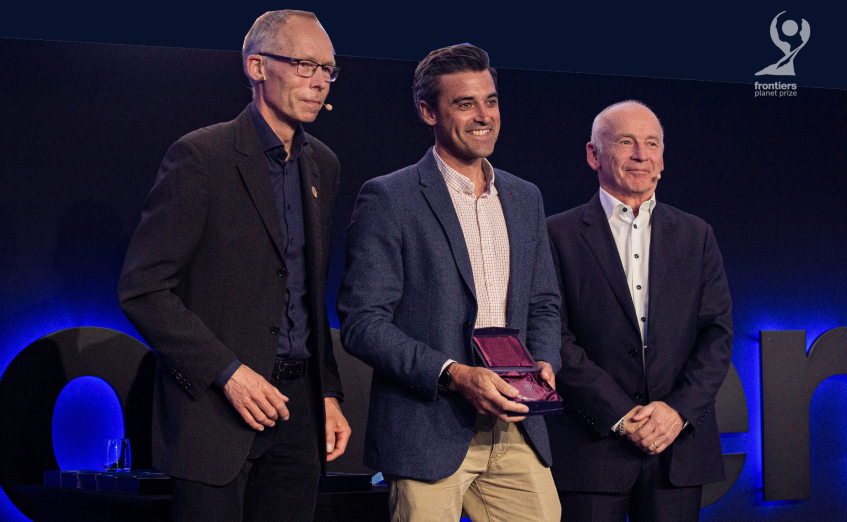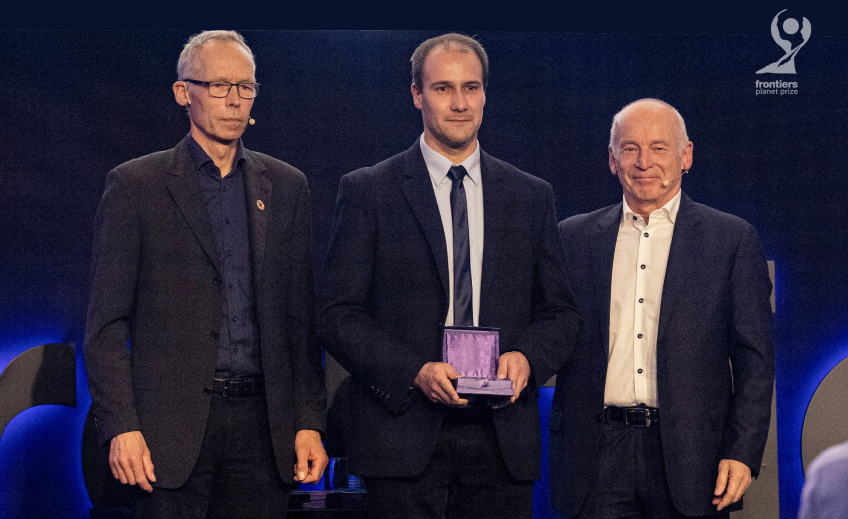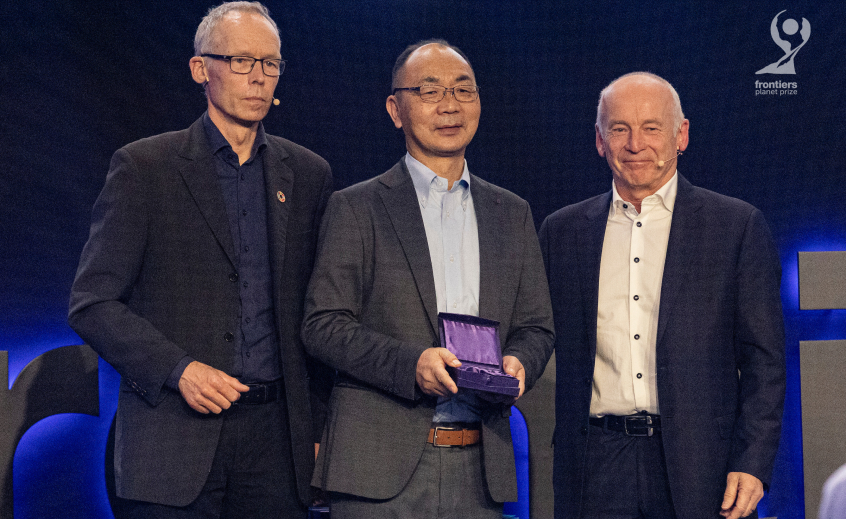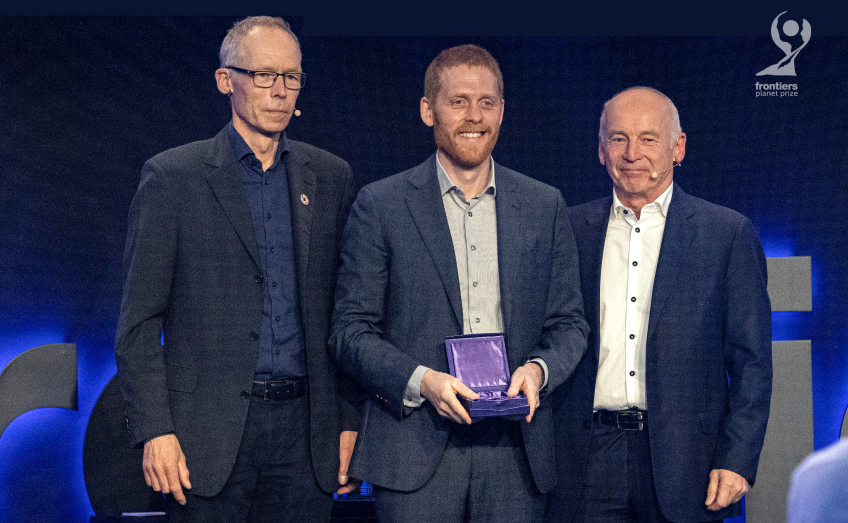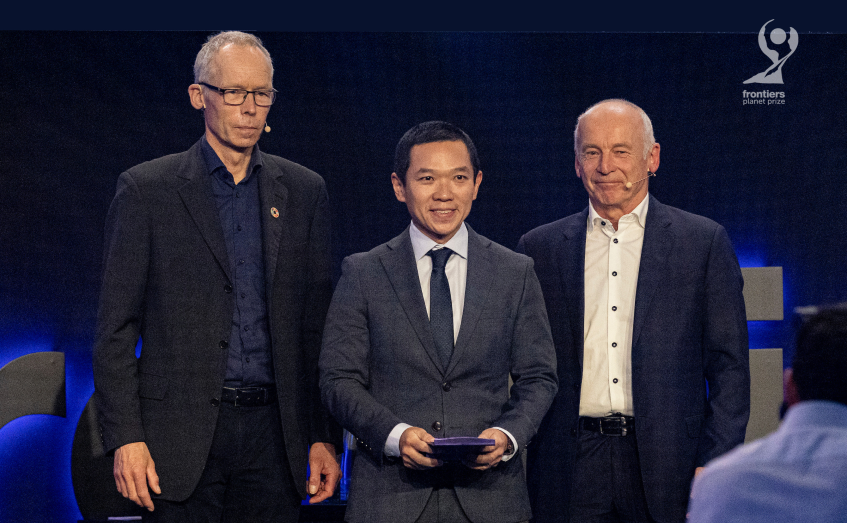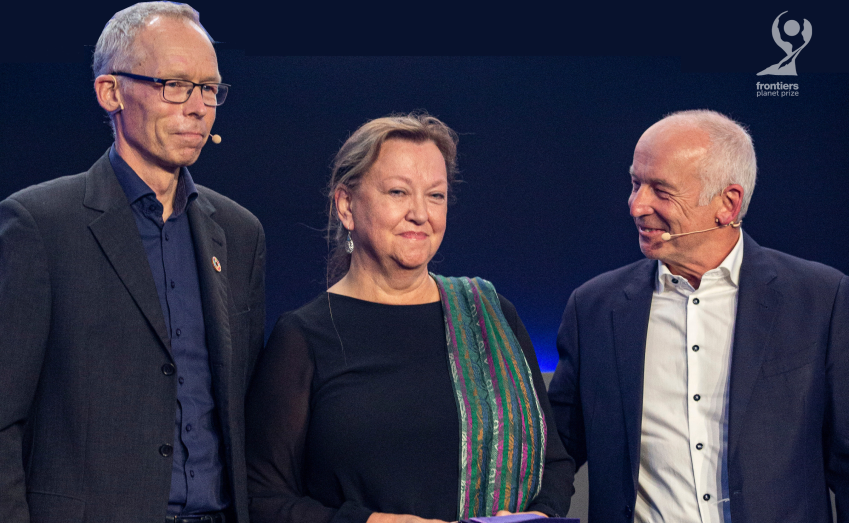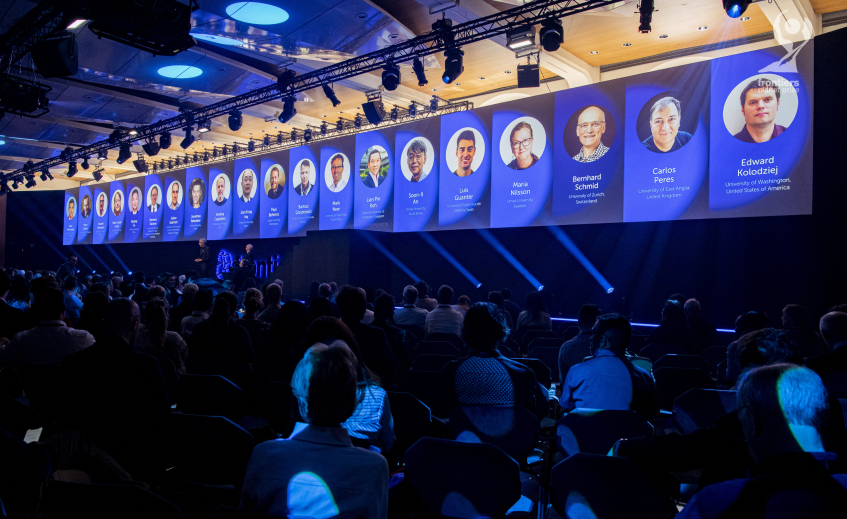The Champions of the first edition
INAUGURAL PRIZE
The International Champions of the Frontiers Planet Prize 2023 have finally been announced on April 27th during the Awards Ceremony at the Frontiers Forum Live. Learn more about the first edition of the prize with our progress report.
Meet the 1st edition International Champions
Prof Baojing Gu
-
RESEARCH ARTICLE
”Abating ammonia is more cost-effective than nitrogen oxides for mitigating PM2.5 air pollution.” Published in Science.org, 2021. Contributing authors: Lin Zhang, Rita van Dingenen, Massimo Vieno, Hans JM van Grinsven, Xiuming Zhang, Shaohui Zhang, Youfan Chen, Sitong Wang, Chenchen Ren, Shilpa Rao, Mike Holland, Wilfred Winiwarter, Deli Chen, Jianming Xu, and Mark A. Sutton.
Baojing Gu is from Hangzhou, China. He represents the international nitrogen management research group based at Zhejiang University. His team's research is based on how to mitigate global PM2.5 pollution by reducing nitrogen emissions through interdisciplinary analysis of nitrogen budget, atmospheric chemistry, human health, cost-benefit and policy implications. The goals of this initiative are (1) to reduce both atmospheric aerosol loading and nitrogen pollution to the safe planetary boundary, (2) to save economic resources from pollution control and fertiliser use for food production, (3) to increase the efficiency of global PM2.5 pollution control, and (4) to highlight the importance of ammonia abatement for the synergy of food security and environmental protectionBOUNDARIES ADDRESSED
Biogeochemical flows, Atmospheric aerosol loading
Dr Paul Behrens
-
RESEARCH ARTICLE
”Dietary change in high-income nations alone can lead to substantial double climate dividend.” Published in Nature Food, 2022. Contributing authors: Zhongxiao Sun, Laura Scherer, Arnold Tukker, Seth A. Spawn-Lee, Martin Bruckner and Holly K. Gibbs.
Paul Behrens is from the UK and is based at Leiden University in the Netherlands. At the Institute of Environmental Sciences, his group research reducing environmental impacts through changes in behaviour and production. The nominated research looks at how could land freed up by the shift to a plant-based diet be used in high-income countries. There is significant potential for a double dividend if the land saved is returned to natural vegetation (not to mention improvements in biodiversity, water quality, air quality and more). Mr Behrens works in industrial ecology on climate, energy and food systems. He has written a popular science book, The Best of Times, The Worst of Times: Futures from the Frontiers of Climate Science, which describes humanity's current trajectory and possible futures in paired chapters of pessimism and hope.
BOUNDARIES ADDRESSED
Climate change, Land system change
Prof Mark New
-
RESEARCH ARTICLE
”Nature-based solutions in mountain catchments reduce impact of anthropogenic climate change on drought streamflow.” Published in Communications Earth and Environment, 2022. Contributing authors: Petra B. Holden, Alanna J. Rebelo, Piotr Wolski, Romaric C. OdoulaLearn more about itmi, Kamoru A. Lawal, Joyce Kimutai, Tiro Nkemelang.
Mark New is based in Cape Town, South Africa. He represents the AXA Research Chair in African Climate Risk group based at the African Climate and Development Initiative at the University of Cape Town. The research aims to attribute the impacts of climate on society and, more importantly, how different adaptation responses can offset these impacts. This quantification of socio-economic impacts and the effectiveness of adaptation will provide evidence on which forms of adaptation are most effective in different contexts, where investments in adaptation will yield the best returns, and the extent of damage that can be avoided through adaptation. The work aims to provide better information for decision-makers and investors in adaptation, to provide more robust information on losses and damages from climate change, to raise public awareness of climate risk and its impact on human security, and ultimately to make natural and human systems more resilient to the climate risks that cannot be avoided through mitigation.
BOUNDARIES ADDRESSED
Biosphere integrity, Climate change, Freshwater use, Land system change
Prof Carlos Peres
-
RESEARCH ARTICLE
”Sustainable-use protected areas catalyze enhanced livelihoods in rural Amazonia.” Published in Proceedings of the National Academy of Sciences, 2021. Contributing authors: João V. Campos-Silva, Joseph E. Hawes, Torbjørn Haugaasen, Carolina T. Freitas, Richard J. Ladle, and Priscila F. M. Lopes.
Carlos Peres is from Belém, in the eastern Brazilian Amazon. He leads the Amazon Ecology & Conservation Research Group at the University of East Anglia, and his research with the non-profit conservation organisation Instituto Juruá has focused on how best to protect tropical floodplain and forest ecosystems in marginalised tropical regions with poor governance, while rewarding the local stakeholders who proverbially 'hold the fort'. The aim of this 'win-win' conservation-development programme is to demonstrate that it is possible to implement bottom-up initiatives that both protect virtually intact natural ecosystems in the Amazon and improve multiple dimensions of local livelihoods, including education, healthcare and access to markets, sustainable income and information technology.
BOUNDARIES ADDRESSED
Climate change, Freshwater use, Land system change
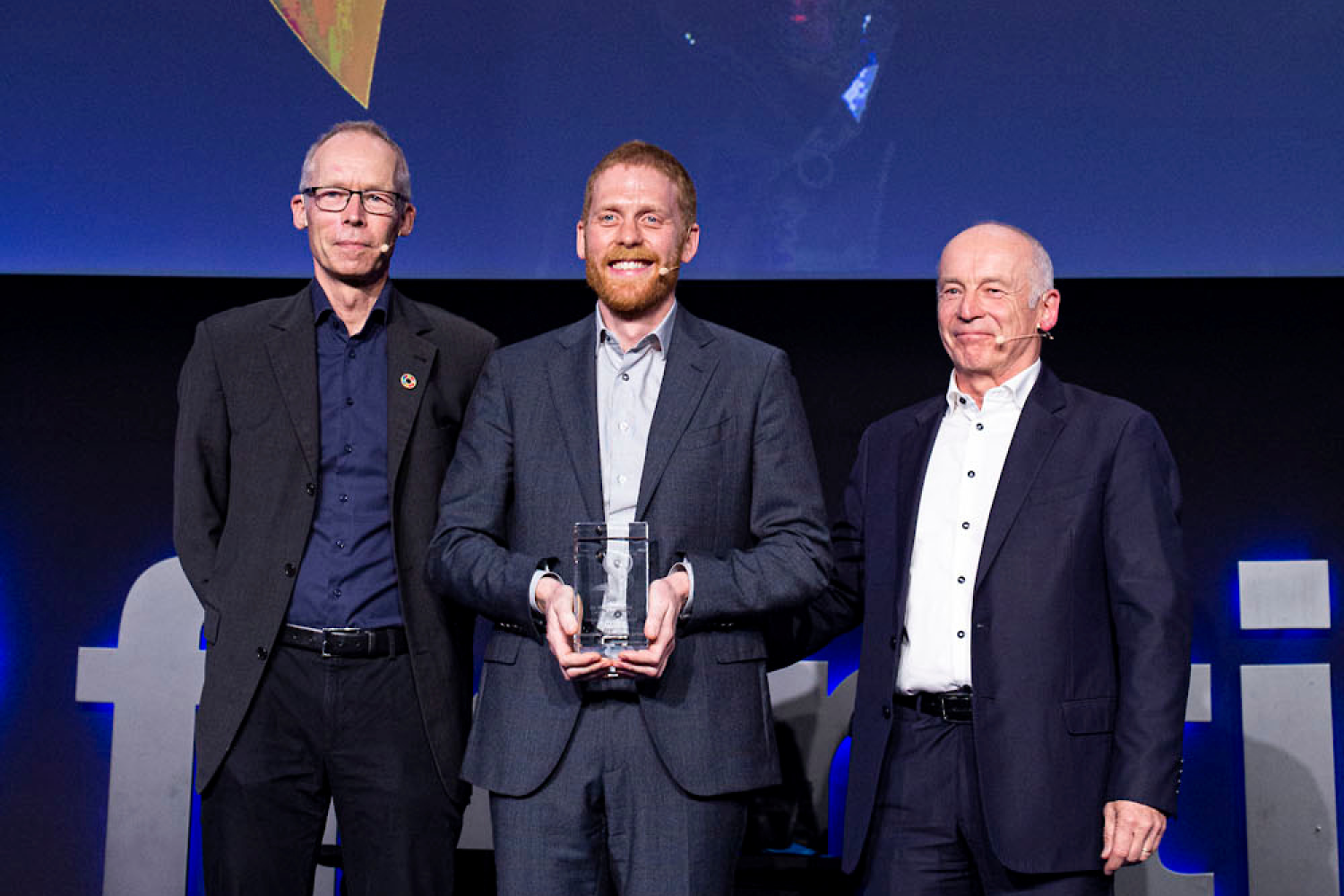


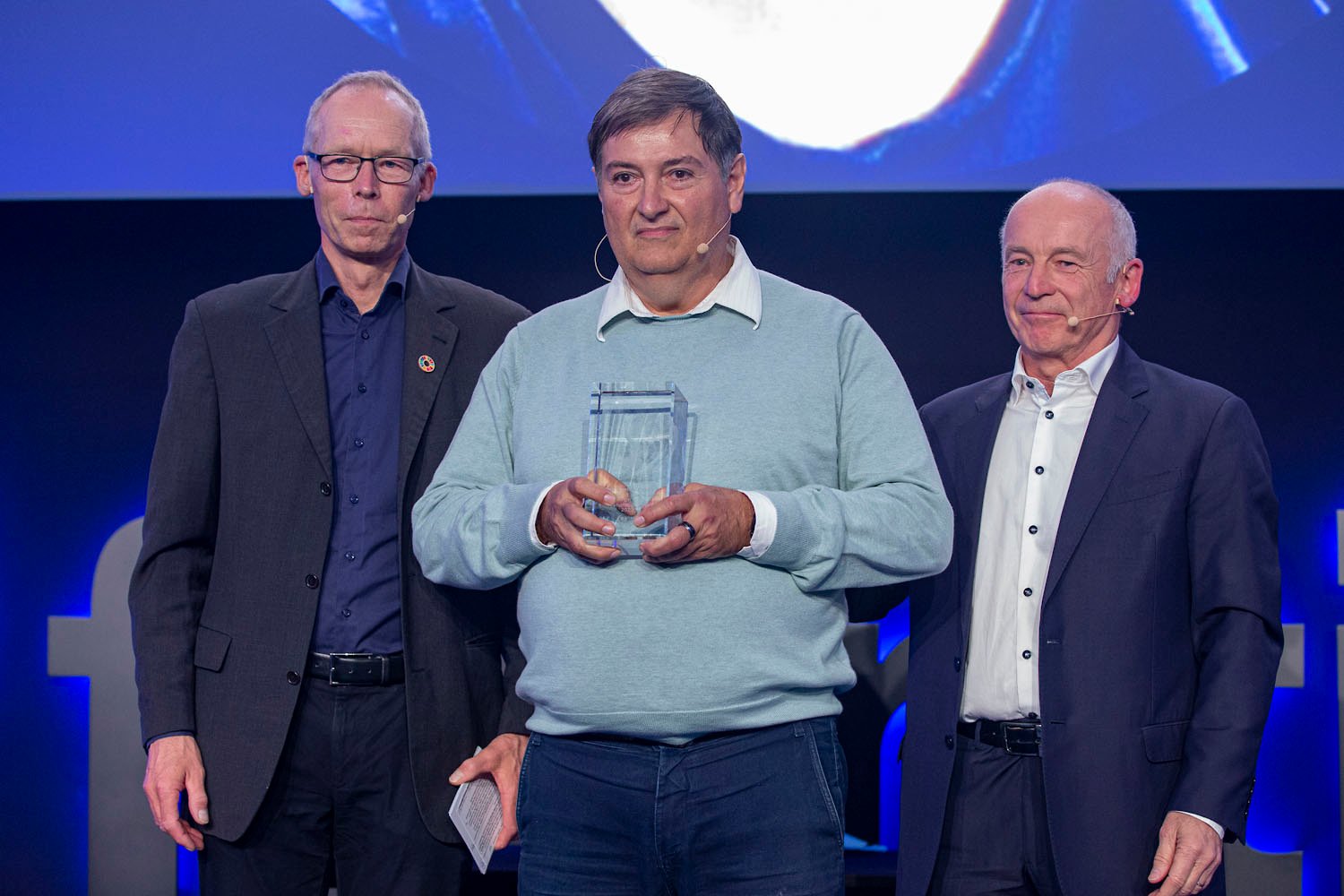




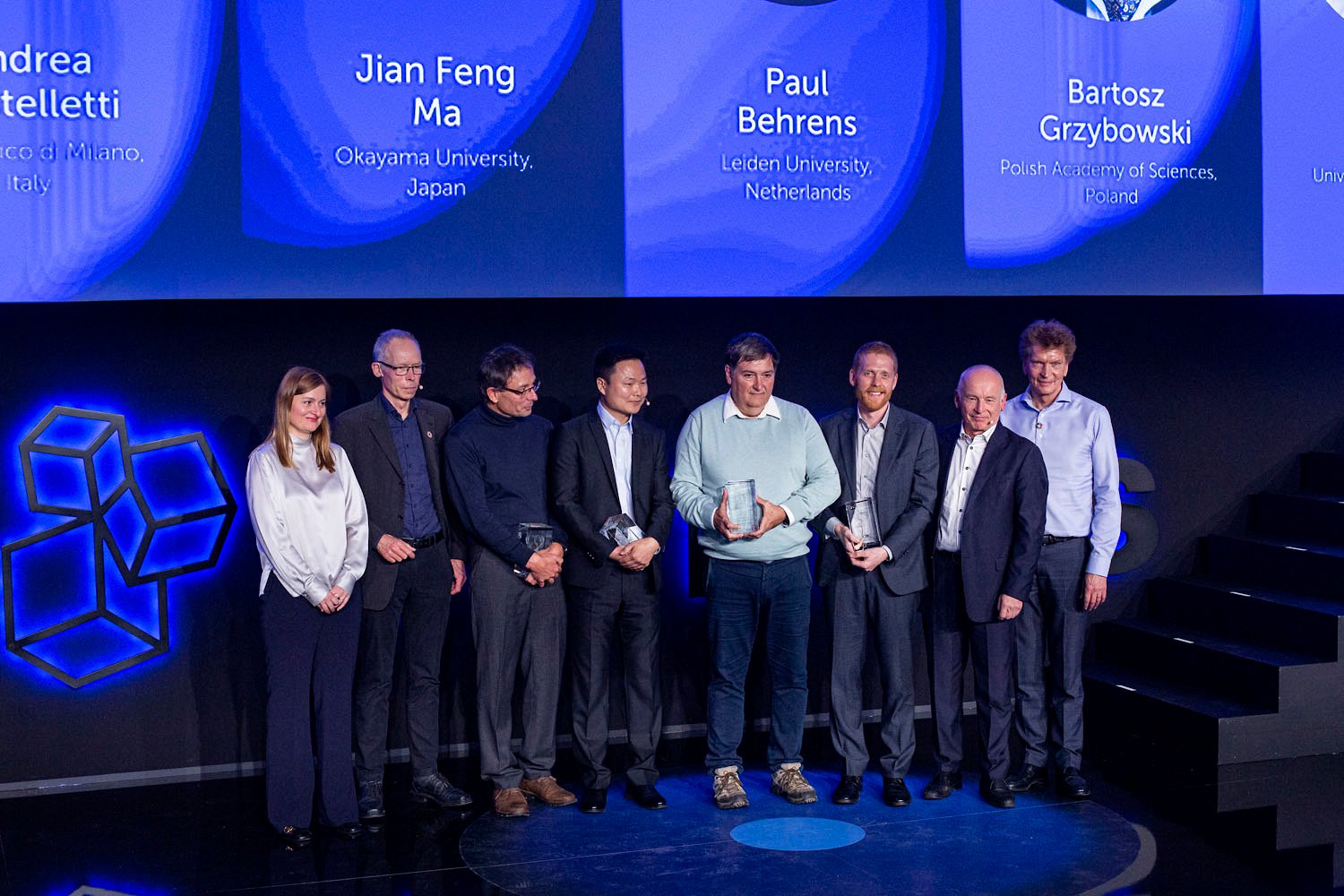
Meet the 1st edition National Champions
Australia
Deakin University
Prof Peter Macreadie
Blue carbon as a natural climate solution
-
Biography:
Peter Macreadie is Professor of Marine Science at Deakin University, Australia, where he founded the Blue Carbon Lab. He and his colleagues have demonstrated the enormous potential for oceans and coasts to contribute to carbon sequestration - known as 'blue carbon' - on a global scale. The current mission is to break down barriers to operationalise blue carbon markets that are scalable, replicable, equitable and cost-effective. In doing so, they aim to create market-based instruments that will establish blue carbon as a new weapon for climate change mitigation and adaptation, while enhancing biodiversity, improving fisheries, restoring cultural connections and improving the resilience of our coastlines.
Planetary Boundaries Addressed:
Biosphere integrity, Climate change, Ocean acidification, Freshwater use, Land system changePublished in: Nature
& Open Access, Bangor University
Contributing authors: Micheli D. P. Costa, Trisha B. Atwood, Daniel A. Friess, Jeffrey J. Kelleway, Hilary Kennedy, Catherine E. Lovelock, Oscar Serrano and Carlos M. Duarte.
Belgium
Université Libre de Bruxelles
Prof Pierre Coheur
Global, regional and national trends of atmospheric ammonia derived from a decadal (2008–2018) satellite record
-
Biography:
Pierre Coheur is a professor at the Université libre de Bruxelles (ULB, Belgium). His research group focuses on the use of hyperspectral satellite imagery to study the global atmosphere. It made a breakthrough by producing the first high-resolution maps of atmospheric ammonia, which revolutionised our view and awareness of nitrogen sources and pollution worldwide. Using a decade of satellite measurements, they took another step forward by deriving long-term trends in ammonia at national, continental and global scales. Building on these achievements, we are now PI for the Earth Explorer 11 candidate mission Nitrosat, which, if selected, would be the most powerful monitoring system of reactive nitrogen fluxes on the planet.
Planetary Boundaries Addressed:
Biosphere integrity, Climate change, Biogeochemical flows, Atmospheric aerosol loadingPublished in: Environmental Research Letters
Contributing authors: Martin Van Damme, Lieven Clarisse, Bruno Franco, Mark A Sutton, Jan Willem Erisman, Roy Wichink Kruit, Margreet van Zanten, Simon Whitburn, Juliette Hadji-Lazaro, Daniel Hurtmans and Cathy Clerbaux.
Brazil
University of Sao Paulo
Prof Ricardo Rodrigues
Balancing natural forest regrowth and tree planting to ensure social fairness and compliance with environmental policies
-
Biography:
Ricardo Ribeiro Rodrigues is from Piracicaba, São Paulo, Brazil. He represents the LERF (Ecology and Forest Restoration Laboratory) research group at the University of São Paulo, whose research is based on how to promote large-scale forest restoration in the tropics, with maximum biodiversity, carbon accumulation and benefits for people, in a way that integrates the landscape with food production. The Group has already restored about 50,000 hectares of forest in the Brazilian agricultural landscape through a programme called Environmental and Agricultural Adequacy of Rural Properties, which promotes the increase of agricultural productivity in areas with greater agricultural aptitude and forest restoration in areas with less agricultural aptitude. The objectives of these initiatives are to (1) restore with natural ecosystems areas historically degraded by agriculture that no longer play a role in food production; (2) ensure that these restored areas provide high-quality ecosystem services; (3) ensure that people can benefit economically from the restored areas; and (4) promote environmentally, socially and economically sustainable food production in the landscape.Planetary Boundaries Addressed:
Climate change, Freshwater use, Land system change, Biogeochemical flows, Atmospheric aerosol loadingPublished in: Journal of Applied Ecology
Contributing authors: Markus Gastauer, Angela Silva Miazaki, Renato Crouzeilles, Paulo A. Tavares and Eric Delgado dos Santos Mafra Lino.
Canada
University of Toronto
Prof Marie-Josée Fortin
Limited spatial rescue potential for coral reefs lost to future climate warming
-
Biography: Marie-Josée Fortin is a University Professor at the University of Toronto. The Spatial Ecology Group's research focuses on biodiversity conservation, using mathematical and statistical modelling to understand how connectivity influences the dynamics of ecosystems worldwide. This collaborative research is the first to demonstrate the potential of six major networks of climate-resilient reefs to sustain and save the rest of the world's coral reef habitat. The results highlight the importance of maintaining functional coral reef habitats outside predicted climate refugia to maintain global connectivity and optimise reef restocking after bleaching events through natural dispersal of coral larvae. These results have the immediate potential to inform global reef prioritisation schemes and structure global reef management initiatives to ensure the continued conservation of reef networks worldwide.
Planetary Boundaries Addressed: Biosphere integrity, Climate changePublished in: Global Ecology and Biogeography
Contributing authors: Ariel Greiner, Marco Andrello, Emily Darling and Martin Krkošek.
Italy
Politecnico Di Milano
Prof Andrea Castelletti
Unintended consequences of climate change mitigation for African river basins
-
Biography:
Andrea Castelletti is Professor of Natural Resources Management at the Politecnico di Milano, Italy, where he heads the Environmental Intelligence for Global change lab, a group of 20 brilliant PhDs, postdocs and junior faculty from diverse backgrounds, all interested in finding sustainable solutions to the challenges of global change. Africa is a major focus of our research. They seek to understand how future climatic and socio-economic developments will affect existing and planned infrastructure for energy and food production, and how to design adaptation pathways that reconcile economic development, societal well-being and ecosystem health. The analysis spans multiple scales and seeks to understand how global climate change policies and international investments affect local communities, and to provide evidence-based feedback to correct unexpected distortions and negative impacts.
Planetary Boundaries Addressed:
Climate change, Freshwater use, Land system changePublished in: Nature Climate Change
& Open Access, Research Square
Contributing authors: Matteo Giuliani, Jonathan R. Lamontagne, Mohamad I. Hejazi and Patrick M. Reed.
Japan
Okayama University
Prof Jian Feng Ma
Duplication of a manganese/cadmium transporter gene reduces cadmium accumulation in rice grain
-
Biography:
Jian Feng Ma is from the Institute of Plant Science and Resources, Okayama University, Japan. He is the group leader of the plant stress physiology group. The research focuses on the identification of various mineral element transporters, including essential, beneficial and toxic elements, in cereal crops, especially rice, a staple food for half of the world's population. The group aims to manipulate mineral element transporters to (1) sustain crop production to solve the world's food shortage problem, (2) increase the density of our essential nutrients such as iron and zinc in edible parts, and (3) reduce toxic elements such as cadmium and arsenic in grains for human health.
Planetary Boundaries Addressed: Climate change, Land system change, Biogeochemical flowsPublished in: Nature Food
Contributing authors: En Yu, Wenguang Wang, Naoki Yamaji, Shuichi Fukuoka, Jing Che, Daisei Ueno, Tsuyu Ando, Fenglin Deng, Kiyosumi Hori, Masahiro Yano and Ren Fang Shen.
Netherlands
Leiden University
Dr Paul Behrens
Dietary change in high-income nations alone can lead to substantial double climate dividend
-
Biography: Paul Behrens is from the UK and is based at Leiden University in the Netherlands. At the Institute of Environmental Sciences, his group research reducing environmental impacts through changes in behaviour and production. The nominated research looks at how could land freed up by the shift to a plant-based diet be used in high-income countries. There is significant potential for a double dividend if the land saved is returned to natural vegetation (not to mention improvements in biodiversity, water quality, air quality and more). Mr Behrens works in industrial ecology on climate, energy and food systems. He has written a popular science book, The Best of Times, The Worst of Times: Futures from the Frontiers of Climate Science, which describes humanity's current trajectory and possible futures in paired chapters of pessimism and hope.
Planetary Boundaries Addressed: Climate change, Land system change
Published in: Nature FoodContributing authors: Zhongxiao Sun, Laura Scherer, Arnold Tukker, Seth A. Spawn-Lee, Martin Bruckner and Holly K. Gibbs.
Poland
Institute of Organic Chemistry, Polish Academy of Sciences
Prof Bartosz Grzybowski
Computer-designed repurposing of chemical wastes into drugs
-
RESEARCH ARTICLE
”Computer-designed repurposing of chemical wastes into drugs.” Published in Nature, 2022. Contributing authors: Agnieszka Wołos, Dominik Koszelewski, Rafał Roszak, Sara Szymkuć, Martyna Moskal, Ryszard Ostaszewski, Brenden T. Herrera, Josef M. Maier, Gordon Brezicki, Jonathon Samuel, Justin A. M. Lummiss, D. Tyler McQuade and Luke Rogers.
Bartosz A. Grzybowski is a Distinguished Professor of Chemistry at UNIST and a Group Leader at the IBS Center for Soft and Living Matter. He is also Professor at the Institute of Organic Chemistry, Polish Academy of Sciences. Although he has spent a large fraction of his research career on esoteric problems of self-assembly and non-equilibrium systems, he considers his most impactful discoveries to be in the field of computer-driven synthesis (e.g., the Chematica/Synthia and Allchemy programs). In particular, he has used these algorithms to address problems of circular chemistry and optimal reusal of chemical wastes, demonstrating upconversion of such wastes into ca. 300 high-value drugs and agrochemicals. Grzybowski is an author of ca. 300 articles, and over the years received numerous accolades of which the 2016 Feynman Prize and the 2022 Foundation for Polish Science Prize are closest to his heart. He started several companies – most recently, Allchemy, Inc. – and has advised various industrial and governmental bodies in areas ranging from AI to drug discovery.
BOUNDARIES ADDRESSED
Novel entities , Climate change, Ocean acidification, Land system change, Biogeochemical flows
China
Zhejiang University
Prof Baojing Gu
Abating ammonia is more cost-effective than nitrogen oxides for mitigating PM2.5 air pollution
-
Biography:
Baojing Gu is from Hangzhou, China. He represents the international nitrogen management research group based at Zhejiang University. His team's research is based on how to mitigate global PM2.5 pollution by reducing nitrogen emissions through interdisciplinary analysis of nitrogen budget, atmospheric chemistry, human health, cost-benefit and policy implications. The goals of this initiative are (1) to reduce both atmospheric aerosol loading and nitrogen pollution to the safe planetary boundary, (2) to save economic resources from pollution control and fertiliser use for food production, (3) to increase the efficiency of global PM2.5 pollution control, and (4) to highlight the importance of ammonia abatement for the synergy of food security and environmental protection
Planetary Boundaries Addressed: Biogeochemical flows, Atmospheric aerosol loadingPublished in: Science
Contributing authors: Lin Zhang, Rita van Dingenen, Massimo Vieno, Hans JM van Grinsven, Xiuming Zhang, Shaohui Zhang, Youfan Chen, Sitong Wang, Chenchen Ren, Shilpa Rao, Mike Holland, Wilfred Winiwarter, Deli Chen, Jianming Xu, and Mark A. Sutton.
Germany
Senckenberg Society for Nature Research Goethe University Frankfurt
Prof Klement Tockner
Global prevalence of non-perennial rivers and streams
-
Biography: Klement Tockner comes from Frankfurt am Main, Germany. He is Professor of Ecosystem Science at Goethe University and Director General of the Senckenberg Nature Research Society. He co-initiated an international team to study rivers and streams that run dry at the surface. These rivers have until recently been overlooked, if not ignored. But the analyses showed that dry rivers make up about 60% of the global river network - they are the rule rather than the exception on Earth. These findings call for a paradigm shift in the way rivers and landscapes are perceived. Dry rivers are (1) critical for maintaining biodiversity, (2) serve as important movement corridors across landscapes, and (3) control global carbon and nutrient dynamics.
Planetary Boundaries Addressed: Biosphere integrity, Climate change, Freshwater use, Land system change, Biogeochemical flowsPublished in: Nature
Contributing authors: Mathis Loïc Messager, Bernhard Lehner, Charlotte Cockburn, Nicolas Lamouroux, Hervé Pella, Ton Snelder, Tim Trautmann, Caitlin Watt and Thibault Datry.
Hungary
Institute for Soil Sciences Centre for Agricultural Research
Dr Gábor Szatmári
Estimating soil organic carbon stock change at multiple scales using machine learning and multivariate geostatistics
-
Biography:
Gábor Szatmári is from Budapest, Hungary, and represents the Pedometrics Research Group at the Institute of Soil Science, Centre for Agricultural Research. The mission of the research group is twofold: (1) to study the spatial and temporal variability of soils using advanced mathematical and statistical approaches, and (2) to support other research fields, stakeholders and policy makers with targeted, spatially explicit information on soils. The latest study, which is the result of a collaboration between our institute, ISRIC - World Soil Information and Wageningen University & Research, provides a solution for accurately estimating soil organic carbon change, which is important for mitigating climate change and neutralising land and soil degradation.
Planetary Boundaries Addressed:
Climate change, Land system changePublished in: Geoderma
Contributing authors: László Pásztor and Gerard B.M. Heuvelink.
Israel
Tel Aviv University
Prof Jonathan Belmaker
A meta-analysis reveals edge effects within marine protected areas
-
Biography:
Jonathan Belmaker represents a research group at Tel Aviv University, Israel. The Earth's biodiversity is both remarkable and fragile. His research team seeks to understand the processes that generate this diversity and how human stressors, including invasive species, warming waters and overfishing, affect the ecological processes that underpin it. The work challenges the conventional wisdom that marine protected areas simply increase the abundance of exploited species. They find that strong edge effects result in population sizes along the boundaries of marine reserves that are significantly smaller than those in the core area. This means that, globally, small marine reserves may only support about half of the population sizes implied by their size. This finding has direct implications for conservation and management efforts.
Planetary Boundaries Addressed: Biosphere integrityPublished in: Nature Ecology and Evolution
Contributing authors: Sarah Ohayon and Itai Granot.
Singapore
National University of Singapore
Prof Lian Pin Koh
Co-benefits of forest carbon projects in Southeast Asia
-
Biography:
Lian Pin Koh is the Kwan Im Thong Hood Cho Temple Chair Professor of Conservation at the National University of Singapore and Director of the University's Centre for Nature-based Climate Solutions. He and his research team seek to produce credible, meaningful and legitimate science to inform nature-based climate policies, strategies and actions. The group aims to build capacity and leadership in the public, private and people sectors to respond to climate challenges and opportunities. Interdisciplinary research measures, models and maps the potential and constraints of nature-based solutions to deliver climate change mitigation and adaptation benefits, financial returns and co-benefits to global society.
Planetary Boundaries Addressed: Biosphere integrity, Climate change, Land system changePublished in: Nature
Contributing authors: Tasya Vadya Sarira, Yiwen Zeng, Rachel Neugarten and Rebecca Chaplin-Kramer.
South Africa
University of Cape Town
Prof Mark New
Nature-based solutions in mountain catchments reduce impact of anthropogenic climate change on drought streamflow
-
Biography:
Mark New is based in Cape Town, South Africa. He represents the AXA Research Chair in African Climate Risk group based at the African Climate and Development Initiative at the University of Cape Town. The research aims to attribute the impacts of climate on society and, more importantly, how different adaptation responses can offset these impacts. This quantification of socio-economic impacts and the effectiveness of adaptation will provide evidence on which forms of adaptation are most effective in different contexts, where investments in adaptation will yield the best returns, and the extent of damage that can be avoided through adaptation. The work aims to provide better information for decision-makers and investors in adaptation, to provide more robust information on losses and damages from climate change, to raise public awareness of climate risk and its impact on human security, and ultimately to make natural and human systems more resilient to the climate risks that cannot be avoided through mitigation.
Planetary Boundaries Addressed: Biosphere integrity, Climate change, Freshwater use, Land system changePublished in: Communications Earth and Environment
Contributing authors: Petra B. Holden, Alanna J. Rebelo, Piotr Wolski, Romaric C. Odoulami, Kamoru A. Lawal, Joyce Kimutai, Tiro Nkemelang.
South Korea
Yonsei University
Prof Soon-Il An
Widespread irreversible changes in surface temperature and precipitation in response to CO2 forcing
-
Biography:
Soon-Il An is from Seoul, Republic of Korea. He represents the Irreversible Climate Change Research Center at Yonsei University, and the research is based on quantifying the spatial patterns of climate hysteresis and irreversibility and addressing the mechanism. The study highlights the potential long-term climate impact of anthropogenic greenhouse gas emissions across the globe at a regional scale, and provides a metric for regional vulnerability and resilience to climate change. The impact of emissions is not limited to the current warming period, but will continue even if emissions are reduced. Moreover, the globally widespread irreversible changes in atmospheric variables would induce irreversible changes in other sub-components of the Earth's systems, such as mountain glaciers, sea ice and rainforests, and developing countries in particular areas more vulnerable to the potential damage caused by greenhouse gas emissions.
Planetary Boundaries Addressed: Climate changePublished in: Nature Climate Change
Contributing authors: Soong-Ki Kim, Jongsoo Shin, Hyo-Jeong Kim, Nari Im, Shang-Ping Xie, Jong-Seong Kug and Sang-Wook Yeh.
Spain
Universitat Politècnica de València
Prof Luis Guanter
Satellite-based survey of extreme methane emissions in the Permian basin
-
Biography:
Luis Guanter is an environmental physicist based in Valencia, Spain. He represents the Land and Atmosphere Remote Sensing (LARS) group that he leads at the Universitat Politècnica de València since 2020. The group currently consists of four early career researchers and himself, and it works on the development of satellite-based methods for monitoring the biosphere. The recent focus has been on the use of space-based imaging spectroscopy techniques for the detection and monitoring of methane emissions from so-called ultra-emitters, which are responsible for a substantial fraction of anthropogenic methane emissions. The group is working with international institutions such as ESA, NASA and UNEP on the use of satellites to reduce methane emissions around the world.
Planetary Boundaries Addressed: Climate changePublished in: Science Advances
Contributing authors: Itziar Irakulis-loitxate, Yin-nian Liu, Daniel J. Varon, Joannes D. Maasakkers, Yuzhong Zhang, Apisada Chulakadabba, Steven C. Wofsy, Andrew K. Thorpe, Riley M. Duren, Christian Frankenberg, David R. Lyon, Benjamin Hmiel, Daniel H. Cusworth, Yongguang Zhang, Karl Segl, Javier Gorroño, Elena Sánchez-García, Melissa P. Sulprizio, Kaiqin Cao, Haijian Zhu, Jian Liang, Xun Li, Ilse Aben, and Daniel J. Jacob.
Sweden
Umeå University
Prof Maria Nilsson
Tracking progress on health and climate change in Europe
-
Biography:
Maria Nilsson is Professor of Public Health, specialising in climate change and health, at the Department of Epidemiology and Global Health, Umeå University, Sweden. She represents the Lancet Countdown in Europe research group, a transdisciplinary research collaboration that monitors progress on health and climate change in Europe. As one of the largest current and historical contributors to greenhouse gas emissions and a major funder of climate change mitigation and adaptation, Europe's response is critical for both human health and the planet. To ensure that health and well-being are protected, we aim to build capacity to understand, monitor and quantify the health impacts of climate change and the health co-benefits of accelerated action, in collaboration with global initiatives.
Planetary Boundaries Addressed: Climate changePublished in: Lancet Public Health
Contributing authors: Marina Romanello, Kim van Daalen, Josep M. Anto, Niheer Dasandi, Paul Drummond, Ian G. Hamilton, Slava Jankin, Vladimir Kendrovski, Rachel Lowe, Joacim Rocklöv, Oliver Schmoll, Jan C. Semenza and Cathryn Tonne.
Switzerland
University of Zurich
Prof Bernhard Schmid
Multispecies forest plantations outyield monocultures across a broad range of conditions
-
Biography:
Bernhard Schmid is from Zurich, Switzerland. He represents an international research group working on the relationship between biodiversity and ecosystem services. Using comparative and experimental approaches, the group has found that diverse forests can sequester up to twice as much carbon per unit area as monoculture plantations. This suggests that the planetary boundaries for biodiversity and climate are closely linked. Novel forest management strategies can combine biodiversity conservation and climate mitigation through carbon sequestration in a win-win way. To achieve this goal, the group identified those traits of tree species that enhance complementary and facilitative interactions between them, thus underpinning the beneficial effects of forest biodiversity on ecosystem services.
BOUNDARIES ADDRESSED
Biosphere integrity, Climate change, Biogeochemical flowsPublished in: Science
Contributing authors: Yuhao Feng, Michel Loreau, David I. Forrester, Songlin Fei, Jianxiao Zhu, Zhiyao Tang, Jiangling Zhu, Pubin Hong, Chengjun Ji, Yue Shi, Haojie Su, Xinyu Xiong, Jian Xiao, Shaopeng Wang and Jingyun Fang.
UK
University of East Anglia
Prof Carlos Peres
Sustainable-use protected areas catalyze enhanced livelihoods in rural Amazonia
-
Biography:
Carlos Peres is from Belém, in the eastern Brazilian Amazon. He leads the Amazon Ecology & Conservation Research Group at the University of East Anglia, and his research with the non-profit conservation organisation Instituto Juruá has focused on how best to protect tropical floodplain and forest ecosystems in marginalised tropical regions with poor governance, while rewarding the local stakeholders who proverbially 'hold the fort'. The aim of this 'win-win' conservation-development programme is to demonstrate that it is possible to implement bottom-up initiatives that both protect virtually intact natural ecosystems in the Amazon and improve multiple dimensions of local livelihoods, including education, healthcare and access to markets, sustainable income and information technology.
Planetary Boundaries Addressed: Climate change, Freshwater use, Land system changePublished in: Proceedings of the National Academy of Sciences
Contributing authors: João V. Campos-Silva, Joseph E. Hawes, Torbjørn Haugaasen, Carolina T. Freitas, Richard J. Ladle, and Priscila F. M. Lopes.
USA
University of Washington
Prof Edward Kolodziej
A ubiquitous tire rubber–derived chemical induces acute mortality in coho salmon
-
Biography:
Ed Kolodziej represents the Division of Sciences and Mathematics (U. of Washington-Tacoma), the Department of Civil and Environmental Engineering (U. of Washington-Seattle), and the Center for Urban Waters. Key contributors to this research included Dr Zhenyu Tian (Dept of Chemistry and Chemical Biology, Northeastern U.), Dr Jenifer McIntyre (Washington State University-Puyallup), Dr Katherine Peter (Center for Urban Waters), Dr Nina Zhao (Center for Urban Waters). Nina Zhao (Center for Urban Waters), Dr Michael Dodd (U. of Washington), Dr Rebecca Sutton (San Francisco Estuary Institute), Dr Andre Simpson (U. of Toronto) and Dr Nat Scholz (NOAA-NMFS). Working together to understand decades of unexplained observations of coho salmon deaths following autumn rainstorms, this amazing team identified a highly toxic chemical, "6PPD quinone", ubiquitous in tyre rubber, as the cause of these deaths. To solve this problem, tyres should be reformulated to replace toxic chemicals with safe alternatives.
Planetary Boundaries Addressed: Novel entities, Freshwater usePublished in: Science
Contributing authors: Zhenyu Tian, Haoqi Zhao, Katherine T. Peter, Melissa Gonzalez, Jill Wetzel, Christopher Wu, Ximin Hu, Jasmine Prat, Emma Mudrock, Rachel Hettinger, Allan E. Cortina, Rajshree Ghosh Biswas, Flávio Vinicius Crizóstomo Kock, Ronald Soong, Amy Jenne, Bowen Du, Fan Hou, Huan He, Rachel Lundeen, Alicia Gilbreath, Rebecca Sutton, Nathaniel L. Scholz, Jay W. Davis, Michael C. Dodd, Andre Simpson and Jenifer K. Mcintyre.
